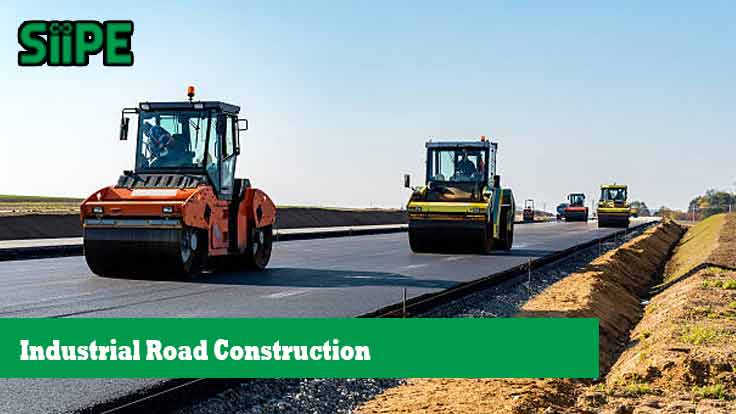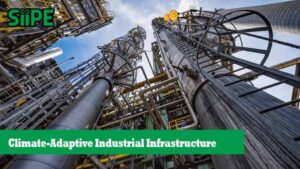Industrial road construction plays a crucial role in economic development by facilitating transportation, enhancing connectivity, and supporting industries such as manufacturing, logistics, and mining.
These roads must withstand heavy loads, harsh environmental conditions, and high traffic volumes. This guide explores the key aspects of industrial road construction, including materials, techniques, challenges, and innovations in the industry.
Understanding Industrial Road Construction
Industrial roads differ from regular roads in terms of design, materials, and durability requirements. They are built to accommodate heavy-duty vehicles such as trucks, construction equipment, and industrial machinery. These roads are commonly found in industrial zones, mining areas, ports, and large-scale infrastructure projects.
Key Phases in Industrial Road Construction
1. Planning and Design
The planning and design phase involves site surveys, feasibility studies, and environmental impact assessments. Engineers analyze soil conditions, traffic patterns, and load-bearing capacity to determine the best construction approach.
2. Site Preparation
Before construction begins, the site must be cleared of vegetation, debris, and existing structures. Grading and excavation are performed to create a stable foundation.
3. Foundation and Base Layers
The foundation is critical for ensuring road stability. A strong subgrade layer is prepared using compacted soil and aggregates to prevent settlement and deformation.
4. Pavement Construction
The choice of pavement material depends on factors such as load requirements, climate, and budget. Common materials include asphalt, concrete, and composite pavements.
5. Drainage Systems
Proper drainage is essential to prevent water accumulation and road deterioration. Industrial roads incorporate culverts, ditches, and stormwater management systems.
6. Finishing and Safety Measures
The final stage includes road markings, signage, guardrails, and lighting to ensure safety and functionality.
Materials Used in Industrial Road Construction
1. Asphalt
Asphalt is a popular choice due to its durability, flexibility, and cost-effectiveness. It provides a smooth surface and can withstand heavy loads with proper maintenance.
2. Concrete
Concrete roads are highly durable and resistant to heavy traffic and extreme weather conditions. They have a longer lifespan but require higher initial costs.
3. Gravel and Crushed Stone
Gravel roads are commonly used in remote industrial areas. They are cost-effective but require frequent maintenance to remain functional.
4. Geosynthetics and Stabilizers
Geosynthetic materials, such as geotextiles and geogrids, enhance soil stability and reduce road maintenance costs.
Challenges in Industrial Road Construction
1. Harsh Environmental Conditions
Industrial roads often face extreme weather conditions, such as heavy rainfall, snow, and high temperatures, which can accelerate wear and tear.
2. Heavy Traffic Loads
Frequent movement of heavy vehicles leads to pavement deformation and cracks, necessitating robust construction techniques.
3. High Construction Costs
The cost of industrial road construction is significantly higher than standard roads due to the need for specialized materials and engineering expertise.
4. Regulatory and Environmental Compliance
Industrial road projects must comply with environmental regulations, zoning laws, and safety standards, adding complexity to the construction process.
Innovations and Technology in Industrial Road Construction
1. Smart Road Technology
Smart sensors embedded in roads provide real-time data on traffic flow, load capacity, and maintenance needs.
2. Recycled and Sustainable Materials
The use of recycled asphalt, concrete, and eco-friendly additives reduces environmental impact and construction costs.
3. 3D Printing and Automation
3D printing technology enables rapid road construction by producing pre-fabricated components with high precision.
4. Drones and AI for Site Monitoring
Drones equipped with AI analyze construction sites, monitor progress, and detect potential issues early.
5. Self-Healing Materials
New materials with self-healing properties help extend road lifespan by automatically repairing minor cracks and damage.
How SIIPE Supports Industrial Road Construction
SIIPE can assist in industrial road construction by providing integrated solutions, from planning to execution. With expertise in supplying materials and services that support industrial infrastructure, SIIPE offers high-quality products, such as durable and robust road materials, as well as construction equipment suitable for industrial road projects. We collaborate with various partners to ensure that the roads built meet safety standards, durability, and operational efficiency, facilitating the smooth movement of goods and heavy vehicles to support industrial activities.
Q&A: Common Questions About Industrial Road Construction
Q: What factors determine the cost of industrial road construction?
A: The cost is influenced by factors such as material selection, road length, terrain complexity, environmental regulations, and labor expenses.
Q: What is the best material for industrial roads?
A: Asphalt and concrete are the most commonly used materials. Asphalt is cost-effective and flexible, while concrete offers greater durability and a longer lifespan.
Q: How long does it take to construct an industrial road?
A: The duration varies depending on the project’s scale, weather conditions, and regulatory approvals. Small projects can take a few months, while large-scale industrial roads may take years to complete.
Q: How can technology improve industrial road construction?
A: Technologies like AI-powered monitoring, smart sensors, drones, and sustainable materials help improve efficiency, reduce costs, and enhance durability.











